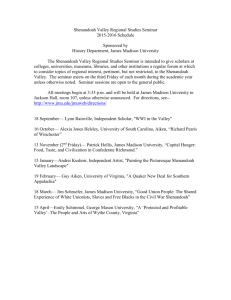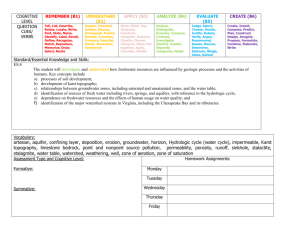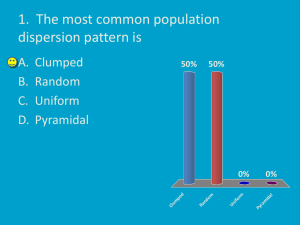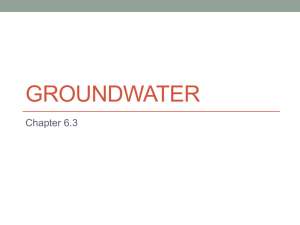Shenandoah Valley
advertisement
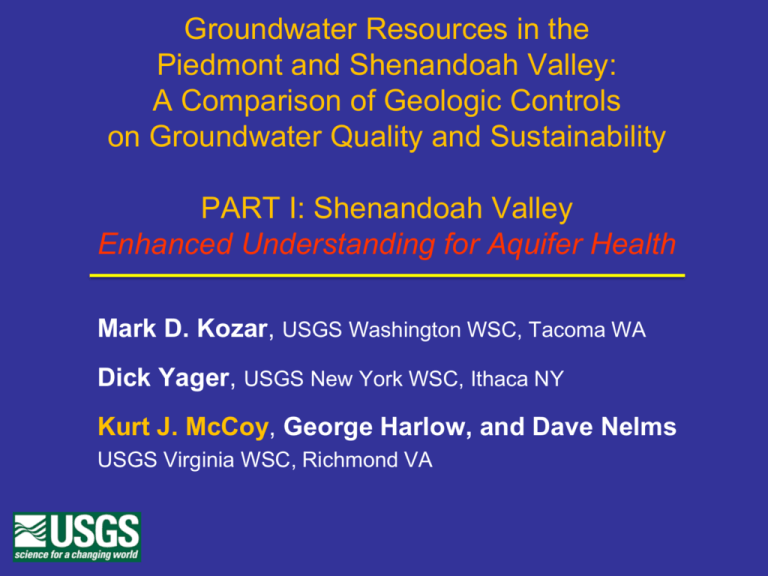
Groundwater Resources in the Piedmont and Shenandoah Valley: A Comparison of Geologic Controls on Groundwater Quality and Sustainability PART I: Shenandoah Valley Enhanced Understanding for Aquifer Health Mark D. Kozar, USGS Washington WSC, Tacoma WA Dick Yager, USGS New York WSC, Ithaca NY Kurt J. McCoy, George Harlow, and Dave Nelms USGS Virginia WSC, Richmond VA Karst Continuum Model CAVES OF THE EASTERN PANHANDLE •Not that many caves –42 known caves in Jefferson County –48 known caves in Berkeley County •Most are short and not of hydrological interest Whitings Neck Cave http://www.swarpa.net/~danforth/photos/caves/wn_weddingcake.jpg Outline – Nested Modeling What is important for aquifer health depends on scale Shenandoah Valley (Yager et al, 2009) 3,300 mi2 Opequon Creek (Kozar and Weary, 2009) 300 mi2 Leetown Science Center (Kozar et al, 2007) 10 mi2 Shenandoah Valley Model 3,300 mi2 Structure Yager, RM, Voss, CI, Southworth, S, 2009, Comparison of alternative representations of hydraulic-conductivity anisotropy in folded fractured-sedimentary rock: modeling groundwater flow in the Shenandoah Valley (USA): Hydrogeology Journal, v. 17, p. 11111131. Shenandoah Valley Regional Conceptual Model (Yager et al., 2009) Numerical Representation Of Regional Scale Anisotropy Groundwater flows along preferential paths (Yager et al., 2009) Well Capture zones – Influence of Anisotropy Meso Scale - Opequon Creek Model Meso-Scale (300 mi2) Conceptual Model Photo courtesy of Craig Wagnell (portaec.net) Epikarst Fractured Karst Fractured Rock Photo by Wil Orndorff Influence of Lithology – ALL ROCKS ARE NOT ALIKE Leetown GroundWater Flow Model Three layer model Tectonic Deformation KARST Vertical permeability contrast Fault Orientation Fracture Orientations in the Leetown Area, WV • Major fractures occur parallel to regional strike N. 20o E. and perpendicular to strike. • Thrust faults parallel to strike and cross strike faults are especially important controls on ground-water flow. Fractures mapped by a) Jones and Deike, 1981 and b) McCoy and others, 2005 Karst zones Fold Hinges or Lithologic Contacts Deformation Orthogonal Fracturing Faults Fracture-Flow Bed-limited permeability Leetown Surface Geophysics – AMT Plan View X-Sect View Scale-Related Evolution of Conceptual Models Primary Deposition 3,300 mi2 Heterogeneity 300 mi2 Tectonic Deformation 10 mi2 Conclusions Nested Models – Scale Dependent Controls on Flow Basin Geometry Orderly Preferential Flow Paths Carbonate Heterogeneity Not All Rocks are Alike Fault Zone Hydrology Important Routes to Drain The Aquifer
